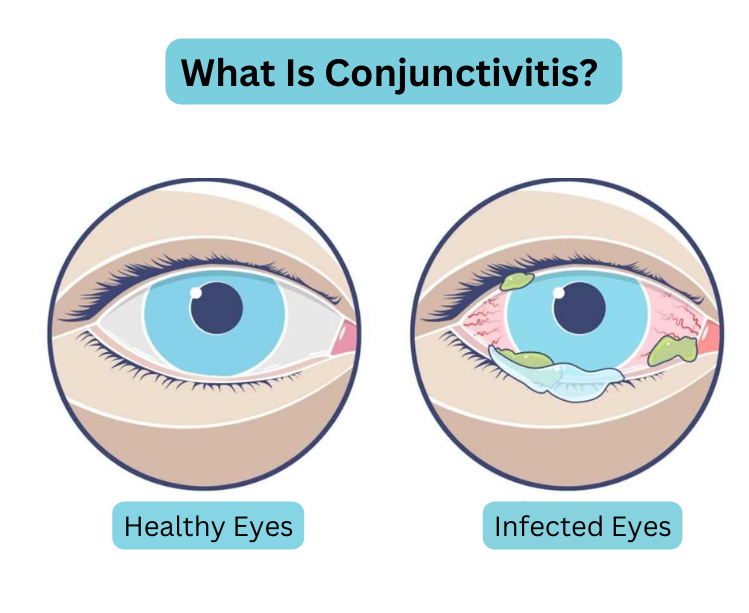Eye Flu / Conjunctivitis Surge Alert: Identifying and Managing Symptoms
India has reported a notable surge in eye flu/conjunctivitis cases recently. The sudden rise in infection can be attributed to the heavy rainfall that have affected different regions in the country.

The heavy rainfall this year has resulted in surge in eye flu cases. It is an infectious and highly contagious condition that affects people of all ages. It is characterized by inflammation or infection of the conjunctiva, the thin, transparent membrane that covers the white part of the eye and the inner surface of the eyelids. In this blog, we will explore the symptoms, causes, prevention, and management of eye flu to help you better protect your eye health.
Causes of Eye Flu (Conjunctivitis)
There are several potential reasons for this inflammation, with the humidity in the atmosphere. During the monsoon season, conjunctivitis is more likely to develop due to the increased dampness and humidity in the atmosphere. These conditions provide an ideal environment for bacteria and viruses to thrive and spread, contributing to the occurrence of conjunctivitis cases. Eye flue also happen
Viral Infection: Viruses, such as adenovirus and herpes simplex, are common causes of viral conjunctivitis.
Bacterial Infection: Bacterial conjunctivitis is typically caused by bacteria like Staphylococcus aureus or Streptococcus pneumoniae.
Allergens:Allergic conjunctivitis results from exposure to allergens like pollen, pet dander, or dust mites.
Irritants: Environmental irritants like smoke, chlorine in swimming pools, or harsh chemicals can trigger irritant conjunctivitis.
Contact Lenses: Improper use or cleaning of contact lenses may lead to contact lens-induced conjunctivitis.

Symptoms of Eye Flu (Conjunctivitis)
It often presents with symptoms of redness, itching, or irritation in the eyes. These symptoms are more likely to manifest during the monsoon season.
· One of the most common signs of conjunctivitis is the reddening of the eye, giving it a bloodshot appearance.
· Irritation and itching in the affected eye are frequent symptoms.
· Conjunctivitis often leads to excessive tearing, causing a watery discharge.
· A feeling of grittiness or a foreign object in the eye may be experienced.
· The eyelids may stick together due to dried discharge, particularly upon waking up.
· Sensitivity to light, known as photophobia, can be present.
· Vision may become temporarily blurred in some cases.
How Does Conjunctivitis/Eye Flu Spread
Eye flu can spread through various means, depending on the underlying cause of the infection. The main mode of transmission is through direct contact with the discharge from an infected person's eyes. When an infected person touches their eyes and then touches another person or object, the virus or bacteria can be transferred. The virus can also survive on surfaces for a limited period. If a person touches an infected surface, such as a doorknob, towel, or shared object, and then touches their eyes, they may contract the infection. Sharing personal items like towels, washcloths, eye makeup, or contact lenses with an infected person can spread the infection. Also, respiratory droplets from an infected person's cough or sneeze can land on the conjunctiva of others and cause an infection. Sometimes it can be triggered by exposure to allergens like pollen or pet dander, but it doesn't spread from person to person.
Foods to Add to Your Diet
Consume foods high in vitamins A, C, and E for immune support and faster healing. Carrots, spinach, oranges, strawberries, and almonds are good options. Drink plenty of fluids to stay hydrated. Include Omega-3 Foods: Incorporate omega-3 fatty acid-rich foods like salmon, walnuts, flaxseeds, and chia seeds to reduce eye inflammation.

Prevention & Management Tips for Eye Flu
Managing eye flu at home is essential to alleviate symptoms, prevent spreading the infection, and support the healing process. It can also help in promoting a faster recovery.
Tip 1. Practice good hygiene. Regularly washing your hands with soap and water can prevent the spread of infection.
Tip 2. Refrain from touching your eyes, as this can worsen the infection and spread it to the other eye or other people.
Tip 3. Avoid sharing towels, tissues, eye makeup, or contact lenses with others.
Tip 4. When outdoors, wear sunglasses or goggles to shield your eyes from irritants and allergens.
Tip 5. If you have allergies, take steps to manage them effectively to reduce the risk of allergic conjunctivitis.
Tip 6. If you wear contact lenses, follow proper cleaning and hygiene practices as instructed by your eye care professional.
Tip 7. Limit screen time and take breaks to rest your eyes.
Tip 8. Apply warm compresses to closed eyelids to reduce inflammation and soothe itching. You can also use a clean cloth soaked in warm water for a few minutes several times a day.
Dr Trust Himalayan Salt Eye Pillow - Your Soothing Relief for Eye Flu
Don't let eye flu disrupt your day! Experience instant comfort and relief with Dr Trust Himalayan Salt Eye Pillow, specially designed to ease the discomfort of eye flu. Infused with authentic Himalayan salt, this pillow offers natural healing properties to aid in relieving eye flu discomfort. This versatile pillow can be used as a hot compress to alleviate symptoms and promote faster healing. The soft fabric and ergonomic design ensure a perfect fit, allowing you to relax and indulge in much-needed relief. Ideal for cold therapy too! Chill the pillow to reduce puffiness and soothe tired eyes after a long day. Simply heat in the microwave or chill in the freezer for your preferred therapy.
· Natural and safe remedy for eye flu symptoms.
· Handcrafted with care using high-quality materials.
· Perfect for home use or while traveling.
· Provides a spa-like experience at your convenience.

Order now and enjoy the soothing embrace of our eye pillow during your recovery journey.
Notably, if you experience any symptoms of conjunctivitis, promptly consult an eye care professional for appropriate diagnosis and treatment. Taking proper care of your diet and following medical advice will help you manage eye flu effectively and ensure a swift recovery.
